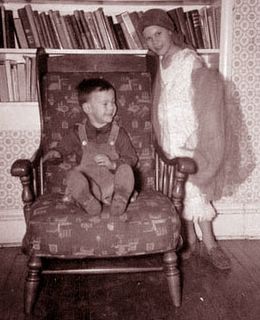
From A Distance

From A Distance
Songwriter Julie Gold is perhaps best known for her song From a Distance which for unknown reasons was on my brain when I woke up this morning. Oddly a photo snapshot of me at age 10 or eleven in the church court yard wearing a white vee-necked tenis sweater was too. I've seen that picture fairly recently, but can't remember where. The photo posted is of a younger Kaunda, standing, along with my brother, seated.
By the clothes I'm wearing, you might ask: "What was he thinking?" As it turns out I've got some idea even now from a distance of more than forty years. I was adventuring being "The Man from Alagash."
The question posed by the 2004 movie I Heart Huckabees is : "How am I not myself?" Puzzling enough, and yet most of us have little trouble recognizing our images in photographs even when we're in disguise.
The picture I had in mind--me wearing the tennis sweater--is a little more straightforward because I remember having a pretty good idea of me myself then. I wonder: If we can recognise ourselves at a distance of many years; how is it we so easily lose sight that others in distant parts of the world are people like us?
"From a distance you look like my friend
Even though we are at war
From a distance I can't comprehend
What all this war is for"
What can any of us do from a distance? The song continues:
"From a distance there is harmony
And it echoes thru the land
It's the hope of hopes
It's the love of loves
It's the heart of every man
It's the hope of hopes
It's the love of loves
It's the heart of every man"
I like that Gold uses "the heart of every man." I'm sure she thought of the more inclusive alternatives, but as a man it's nice to know she believes that even male persons have heart.
In this morning's Post-Gazette there's an article, "Children are victims of Africa's AIDS." I'd be happy to link to the article there, but I couldn't find it on the Web site. The article is by Laurie Goering, the Chicago Tribune's foreign correspondent, so the link is there. 12.5 million children across sub-Saharan Africa have lost a parent to AIDS, and a new report suggests by the decade's end more than 18 million children in the region will be orphaned by the disease. International efforts to staunch the spread of AIDS among children are widely short of funding targets.
Elizabeth Rapuleng runs a donor-funded center that feeds 350 children in Soweto was quoted in Goering's article:
"Most are not getting help; they have no one to speak for them. What I'm doing here is just a drop in the ocean."
There clearly is a need for efforts on a massive scale. But, I believe that the small efforts of many may be even more essential. The idea of Bazungu Bucks is to come up with small ways that people from a distance can make a difference for struggling people in Africa; call it "a drop in the ocean" strategy.
I don't believe my heart is any different, rather like the song says: "It's the heart of every man" and woman too. People have the power, so let's use it.
No comments:
Post a Comment